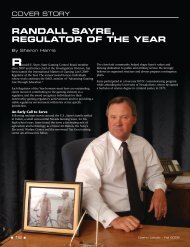View current issue (PDF) - International Masters of Gaming Law
View current issue (PDF) - International Masters of Gaming Law
View current issue (PDF) - International Masters of Gaming Law
Create successful ePaper yourself
Turn your PDF publications into a flip-book with our unique Google optimized e-Paper software.
The United Kingdom: licensing andtaxation on a point <strong>of</strong> consumption basisTony Coles and Andrew Cotton, Jeffrey Green Russell LimitedTony ColesAndrew CottonIntroductionThe move to licensing and taxation <strong>of</strong> remotegambling on a point <strong>of</strong> consumption basis in theUK gathers pace. The Gambling (Licensing andAdvertising) Bill (the “Bill”), which will amendthe licensing requirements <strong>of</strong> the Gambling Act2005, received its first reading in the House <strong>of</strong>Commons on 9th May 2013 and is expected tobecome law by the end <strong>of</strong> 2013 and take effect fromas early as April 2014.Meanwhile, on 16 August, HM Treasury publishedit legislative proposals on taxation, in light <strong>of</strong> theresponses received from the industry to its taxconsultation.The Gambling(licensing and Advertising) BillWhat is the effect <strong>of</strong> the Bill?i) The Bill will extend the territorial application<strong>of</strong> Section 33 <strong>of</strong> Gambling Act 2005 (the <strong>of</strong>fence<strong>of</strong> providing facilities for gambling), requiring allremote operators to obtain an Operating Licencefrom the Gambling Commission if they wish to dobusiness with British residents. The Bill will do this bysubstituting Section 36(3) as follows:Section 33 applies to the provision <strong>of</strong> facilities forremote gambling only if –(a) at least one piece <strong>of</strong> remote gambling equipmentused in the provision <strong>of</strong> the facilities is situated inGreat Britain, or(b) no such equipment is situated in Great Britainbut the facilities are capable <strong>of</strong> being used there.[emphasis added]ii) The Bill also proposes the repeal <strong>of</strong> the <strong>of</strong>fence <strong>of</strong>advertising foreign gambling (Section 331) and wouldthereby remove the <strong>current</strong> exemption permittingoperators licensed in EEA and “white-listed”jurisdictions to advertise their services in Britainwithout a British licence.iii) It would also extend the territorial scope <strong>of</strong> the<strong>of</strong>fence <strong>of</strong> advertising unlawful gambling (Section330) and the regulations controlling the advertising<strong>of</strong> remote gambling by way <strong>of</strong> remote communication(Section 328) by amending Section 339(9) in line withthe amendment made to section 36(3).The Case for ChangeMuch has been written before concerning the basisfor the imposition <strong>of</strong> point <strong>of</strong> consumption licensing,and many have speculated as to the possiblesusceptibility <strong>of</strong> the measures to a challenge on thebasis that their compatibility with European law.For its part, the government concludes that, “the<strong>current</strong> system is flawed and can no longer adequatelyensure the protections for British customers the[Gambling] Act envisages in a changing Europeanand <strong>International</strong> landscape”.It cites the following as justification for theproposed changes:• Although the majority <strong>of</strong> operators targetingBritish customers are subject to established andeffective regulatory regimes, not all are. The GamblingCommission are aware <strong>of</strong> emerging Europeanjurisdictions where very little is known about the level<strong>of</strong> regulation and consumer protection.• There are different regulatory approaches overseaswith limited consensus in areas such as standardsand s<strong>of</strong>tware testing resulting in varying levels <strong>of</strong>protection for British customers.• There is a potential risk that match fixing andsuspicious betting practices are taking place onoverseas licensed sites.• It is becoming increasingly difficult to identifythe level <strong>of</strong> regulatory oversight <strong>of</strong> gambling servicesand equipment when operators are permitted tolocate equipment in different locations. This canlead to confusion for consumers and prevents theGambling Commission from being able to directlyinvestigate complaints.The Gambling Commission has been pressing the UKgovernment to make the changes for some time citingthe difficulty it has in fulfilling its statutory obligationsto advise the government on gambling, its regulation18 | European <strong>Gaming</strong> <strong>Law</strong>yer | Autumn Issue | 2013



